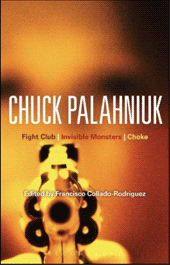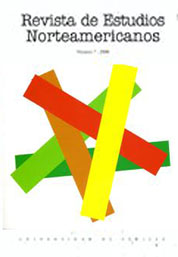Welcome to SAAS
Chuck Palahniuk: Fight Club, Invisible Monsters, Choke (2013). Ed. by Francisco Collado.

Free access to courses taught by distinguished teachers and scholars at Yale University.
Ana Manzanas & Jesús Benito, Cities, Borders and Spaces in Intercultural American Literature and Film

REN: Revista de Estudios Norteamericanos

Call For Papers for Our Next Conference
"A Return to (What Never Was) Normal: Discourses of (Ab)Normalcy in US Culture, Literature, Arts, and Politics; Past, Present, and Future"
PANEL 3
3) "Questioning the Normalcy of the Domestic Space in American Literature"
Panel Chair: Rodrigo Andrés, Universitat de Barcelona
E-mail: rodrigoandres@ub.edu
Three key concepts in the title of the 2023 SAAS conference are (ab)normalcy, return, and temporality ("past, present, and future"). This panel will focus on the idea(l) of the domestic space in order to ask questions such as: what is/would be a normal house and/or household in the first place?, how and why does one return to the memories of the houses one inhabited in the past, and how are houses haunted by the remains (in the form of objects/things or of architectonic decisions and spatial arrangements) of former dwellers?, and, finally, how do houses themselves, with the spaces they generate as well as with their decorative elements, trouble the linearity of an evolutionary temporality that goes (necessarily) (straight) from past to future? American literature is an incredibly rich site to explore these and other questions about living spaces. Authors such as Henry David Thoreau, Nathaniel Hawthorne, Edgar Allan Poe, Herman Melville, Harriet Jacobs, Harriet Beecher Stowe, Charlotte Perkins Gilman, Emily Dickinson, Kate Chopin, Henry James, Edith Wharton, Charles W. Chesnutt, Willa Cather, William Faulkner, John Steinbeck, Ralph Ellison, James Baldwin, John Updike, John Cheever, Toni Morrison, Gloria Naylor, Sandra Cisneros, Yaa Gyasi, Stephanie Powell Watts, Marilynne Robinson, Barbara Kingsolver, and Alison Bechdel, to name but a few, have provided us narratives that directly question discourses of "normal" domestic spaces, households, and familiar and familial living arrangements. Oftentimes they have done so by paying special attention to factors such as social class, ethnicity, gender, sexuality, regionality, age, and (dis)ability. The panel invites contributions on these topics and will also, of course, be open to the panelists' incorporation of other authors and other texts that make us think of the possibilities of questioning the "normal" through the literary analysis of the relationship between domestic spaces and the lives lived in them.
GUIDELINES FOR PARTICIPANTS
Abstracts of Proposals are to be e-mailed directly to the chair of the selected panel using this form. The deadline for submitting abstracts is October 15, 2022. Panel chairs are expected to accept/reject proposals and have panels set up by November 7.
Non-members of SAAS (of all nationalities) are welcome to participate in the conference, but will be required to pay membership dues for one year as well as the conference registration fee. Members of ASA (American Studies Association), AISNA (Associazione Italiana di Studi Nor-Americani), APEAA (Portuguese Association for Anglo-American Studies) and HELAAS (Hellenic Association for American Studies) need only pay the conference registration fee.
Further guideliness for participants can be found here.








